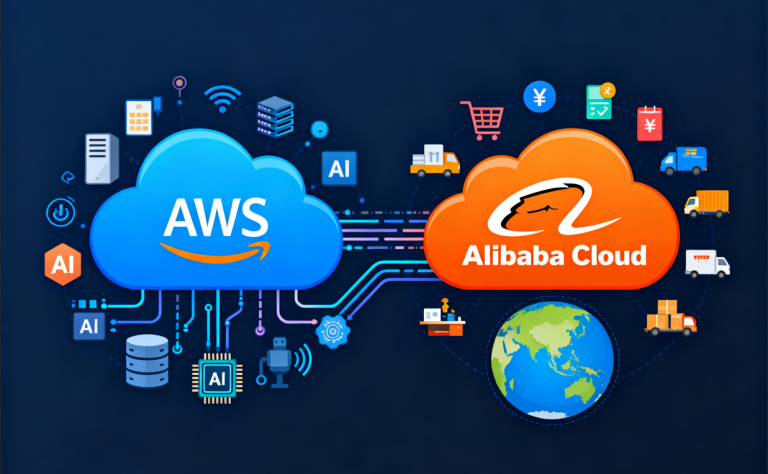
Imagine trying to run a business in the digital age without the cloud. You’d need a room full of expensive servers, a team of IT specialists to manage them, and a constant fear of a power outage or a hard drive failure wiping out everything. It’s a terrifying, outdated way of thinking. The cloud promised a simple solution, didn’t it? Just put your data "in the sky," and everything will be magically handled for you. But then a new kind of confusion hits you: you discover there isn't just one cloud. There are dozens, and two of them—AWS and Alibaba Cloud—dominate the global landscape. You're left wondering, "Which one do I choose? What's the real difference between them?"
This isn’t just a simple choice between two companies; it’s a strategic business decision that will shape your future. Picking the wrong partner is like choosing a car for a long road trip without knowing if it's an off-road vehicle or a tiny city car. You’ll get to your destination, maybe, but the journey will be a bumpy, inefficient mess. This sudden realization that the cloud is not a monolith, but a fierce competition, is where we need to dive in. It's time to understand the two biggest players in the game and what makes them tick, so you can make an informed choice for your business's future.
The Pioneer and the Titan: An Introduction to AWS
When you talk about cloud computing, you have to start with Amazon Web Services (AWS). It's the pioneer, the undisputed global leader. AWS didn't just join the cloud race; it invented the track and set the rules. Launched back in 2006, it started as a humble service selling computing power and storage, and it has since grown into a sprawling digital empire with hundreds of services.
Think of AWS as a massive, digital Swiss Army Knife. It offers everything from basic computing power (EC2) and storage (S3) to advanced machine learning, artificial intelligence, and quantum computing. Do you want to build a simple static website? There’s a service for that. Do you want to run a complex, globally scaled e-commerce platform? There's a collection of services for that too. This incredible breadth is one of AWS's most compelling strengths. Its infrastructure is so vast and its feature set so comprehensive that for many businesses, it feels like the default choice. Its global reach is immense, with data centers in almost every major region of the world, making it a powerful solution for businesses that need to serve customers globally.
The downside? The sheer number of services can be incredibly confusing. It's like walking into a massive hardware store with aisles stretching to the horizon. You know they have the tools you need, but finding them and knowing how to use them can be a challenge. The pricing model, too, can be complex, with a "pay-as-you-go" structure that’s great for flexibility but can lead to unexpected costs if you're not careful. For a small business, navigating the AWS ecosystem can feel overwhelming, like trying to learn a new language. But once you master it, the possibilities are virtually limitless.
The Asian Giant: An Introduction to Alibaba Cloud
Now, let's turn our attention to the challenger, the Asian powerhouse that is Alibaba Cloud. While it may not have the same long history as AWS, Alibaba Cloud has grown with a sudden and explosive force, driven by the massive growth of the Chinese and Asian markets.
If AWS is a Swiss Army Knife, then Alibaba Cloud is a high-tech toolkit specifically designed for the needs of the fastest-growing digital economies. It was born out of Alibaba’s own internal needs to handle massive e-commerce events like Singles' Day, which sees traffic and sales numbers that dwarf Black Friday. Because of this, Alibaba Cloud is uniquely optimized for e-commerce, real-time analytics, and large-scale data processing.
Alibaba Cloud's greatest strength is its deep integration with the Asian market. If you are a business looking to expand into China or other parts of Asia, Alibaba Cloud is not just an option; it’s arguably the most logical choice. Its infrastructure in mainland China is second to none, and it is built to comply with the country's unique regulatory requirements. Trying to navigate Chinese regulations on a foreign cloud platform can feel like trying to run a marathon blindfolded, but Alibaba Cloud was built to run this race. It also offers a full suite of services, from computing (ECS) and storage (OSS) to big data and machine learning, mirroring many of the offerings of its Western counterparts but with a more localized flavor.
The flip side? While its global network is growing rapidly, it's not as extensive as AWS's. If your primary customer base is in North America or Europe, you might find that AWS offers a slightly better localized experience. The documentation and support, while improving quickly, can also sometimes be more challenging for non-Chinese speakers. But for any business with an eye on the booming Asian market, Alibaba Cloud is an essential partner that can help you avoid major regulatory and technical headaches.
A Tale of Two Giants: Key Differences and Strategic Choices
So, how do you decide? It's not about which one is "better" in a vacuum; it’s about which one is better for you.
Global Reach vs. Regional Dominance: If you need a presence in every corner of the globe with a mature, long-standing infrastructure, AWS is the go-to. If you are focused on or planning to enter the Chinese and Asian markets, Alibaba Cloud offers a distinct, localized advantage that is hard to beat.
Breadth vs. Focus: AWS has a staggering number of services for every possible need, making it a great platform for building almost anything. Alibaba Cloud, while also comprehensive, has a particularly strong focus on and deep expertise in e-commerce and big data analytics, a legacy of its parent company's DNA.
Ecosystem Integration: This is a subtle but profound difference. AWS's ecosystem is incredibly independent and vast. Alibaba Cloud's ecosystem is deeply integrated with other Alibaba services like Alipay and Taobao, which can be a massive benefit if you're operating within that ecosystem.
Ultimately, this is a strategic decision that needs careful consideration. You should ask yourself: Where are my customers now, and where will they be in five years? Do I prioritize a long-standing, globally recognized platform, or do I need a partner with deep expertise in the world’s fastest-growing digital markets? The cloud is the future, but that future is not a single destination. It’s a journey, and picking the right vehicle—be it AWS or Alibaba Cloud—is the most important first step you can take.

